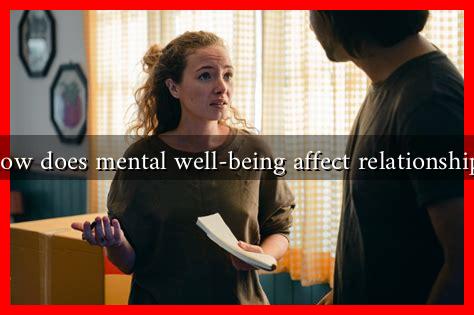-
Table of Contents
How Does Mental Well-Being Affect Relationships?
Mental well-being is a crucial aspect of our overall health, influencing not only how we feel about ourselves but also how we interact with others. Relationships, whether romantic, familial, or platonic, are deeply affected by the mental states of the individuals involved. Understanding this connection can help us foster healthier relationships and improve our quality of life.
The Link Between Mental Well-Being and Relationships
Mental well-being encompasses emotional, psychological, and social aspects of our lives. It affects how we think, feel, and act, and it plays a significant role in how we relate to others. Here are some key ways in which mental well-being impacts relationships:
- Communication: Individuals with good mental health are generally better communicators. They can express their thoughts and feelings clearly, which is essential for resolving conflicts and building trust.
- Empathy: Mental well-being enhances our ability to empathize with others. When we feel good about ourselves, we are more likely to understand and support our partners, friends, and family members.
- Conflict Resolution: A stable mental state allows individuals to approach conflicts with a level head, making it easier to find solutions rather than escalating tensions.
- Emotional Availability: Good mental health fosters emotional availability, enabling individuals to be present and engaged in their relationships.
Case Studies and Statistics
Research has shown a strong correlation between mental well-being and relationship satisfaction. A study published in the Journal of Happiness Studies found that individuals with higher levels of mental well-being reported greater satisfaction in their relationships. Conversely, those struggling with mental health issues often experience strained relationships.
For instance, a case study involving couples therapy revealed that partners who actively worked on their mental health saw a significant improvement in their relationship dynamics. The therapist noted that as each partner learned to manage their anxiety and depression, their communication improved, leading to a more supportive and understanding relationship.
Statistics from the National Institute of Mental Health indicate that approximately 1 in 5 adults in the U.S. experience mental illness in a given year. This prevalence highlights the importance of addressing mental health not just for individual well-being but also for the health of relationships.
Impact of Specific Mental Health Issues
Certain mental health conditions can have a profound effect on relationships. Here are a few examples:
- Anxiety Disorders: Individuals with anxiety may struggle with trust and communication, leading to misunderstandings and conflict.
- Depression: Depression can cause withdrawal and emotional unavailability, making it difficult for partners to connect.
- Personality Disorders: Conditions such as borderline personality disorder can lead to intense emotional fluctuations, impacting relationship stability.
Strategies for Improving Mental Well-Being in Relationships
Improving mental well-being can lead to healthier relationships. Here are some strategies:
- Open Communication: Encourage open dialogue about feelings and mental health. This can help partners understand each other better.
- Seek Professional Help: Therapy can provide tools for managing mental health issues and improving relationship dynamics.
- Practice Self-Care: Engaging in self-care activities can enhance individual mental well-being, positively affecting relationships.
- Build a Support Network: Surrounding oneself with supportive friends and family can provide additional emotional resources.
Conclusion
Mental well-being is a vital component of healthy relationships. It influences communication, empathy, conflict resolution, and emotional availability. By understanding the impact of mental health on relationships, individuals can take proactive steps to improve their mental well-being and, consequently, their relationships. Whether through open communication, professional help, or self-care, prioritizing mental health can lead to more fulfilling and supportive connections with others. As we navigate the complexities of our relationships, let us remember that taking care of our mental health is not just beneficial for ourselves but also for those we love.


